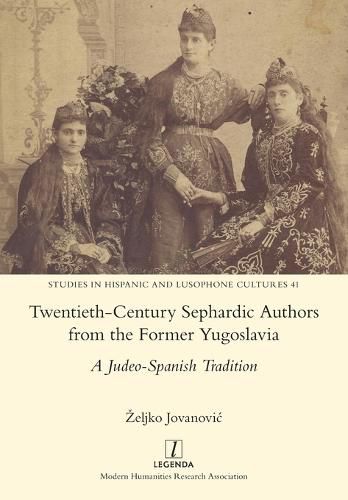Readings Newsletter
Become a Readings Member to make your shopping experience even easier.
Sign in or sign up for free!
You’re not far away from qualifying for FREE standard shipping within Australia
You’ve qualified for FREE standard shipping within Australia
The cart is loading…






This title is printed to order. This book may have been self-published. If so, we cannot guarantee the quality of the content. In the main most books will have gone through the editing process however some may not. We therefore suggest that you be aware of this before ordering this book. If in doubt check either the author or publisher’s details as we are unable to accept any returns unless they are faulty. Please contact us if you have any questions.
In the twentieth century, various Sephardic authors from the former Yugoslavia took upon themselves the task of revitalising different forms of Judeo-Spanish oral tradition such as narrative, songs or ballads. These forms were fostered in the language of the Sepharadim, Ladino or Judeo-Spanish, since the expulsion of the Jews from the Iberian Peninsula in 1492. In their diaspora the Sepharadim mainly settled in the Ottoman Empire whose collapse began at the end of the nineteenth century. This disintegration followed later on by the Holocaust resulted in a rapid decline of the Sephardic language and tradition, causing UNESCO in 2002 to declare Ladino a seriously endangered language. In this interdisciplinary cultural study, Zeljko Jovanovic examines the efforts of the Yugoslav Sephardic authors to preserve the memory of a culture and a language in decline as their way of constructing their own personal and collective narrative and identity.
Zeljko Jovanovic is a researcher in Sephardic studies at the Institute of Language, Literature and Anthropology (ILLA) of the CSIC (Madrid, Spain).
$9.00 standard shipping within Australia
FREE standard shipping within Australia for orders over $100.00
Express & International shipping calculated at checkout
This title is printed to order. This book may have been self-published. If so, we cannot guarantee the quality of the content. In the main most books will have gone through the editing process however some may not. We therefore suggest that you be aware of this before ordering this book. If in doubt check either the author or publisher’s details as we are unable to accept any returns unless they are faulty. Please contact us if you have any questions.
In the twentieth century, various Sephardic authors from the former Yugoslavia took upon themselves the task of revitalising different forms of Judeo-Spanish oral tradition such as narrative, songs or ballads. These forms were fostered in the language of the Sepharadim, Ladino or Judeo-Spanish, since the expulsion of the Jews from the Iberian Peninsula in 1492. In their diaspora the Sepharadim mainly settled in the Ottoman Empire whose collapse began at the end of the nineteenth century. This disintegration followed later on by the Holocaust resulted in a rapid decline of the Sephardic language and tradition, causing UNESCO in 2002 to declare Ladino a seriously endangered language. In this interdisciplinary cultural study, Zeljko Jovanovic examines the efforts of the Yugoslav Sephardic authors to preserve the memory of a culture and a language in decline as their way of constructing their own personal and collective narrative and identity.
Zeljko Jovanovic is a researcher in Sephardic studies at the Institute of Language, Literature and Anthropology (ILLA) of the CSIC (Madrid, Spain).